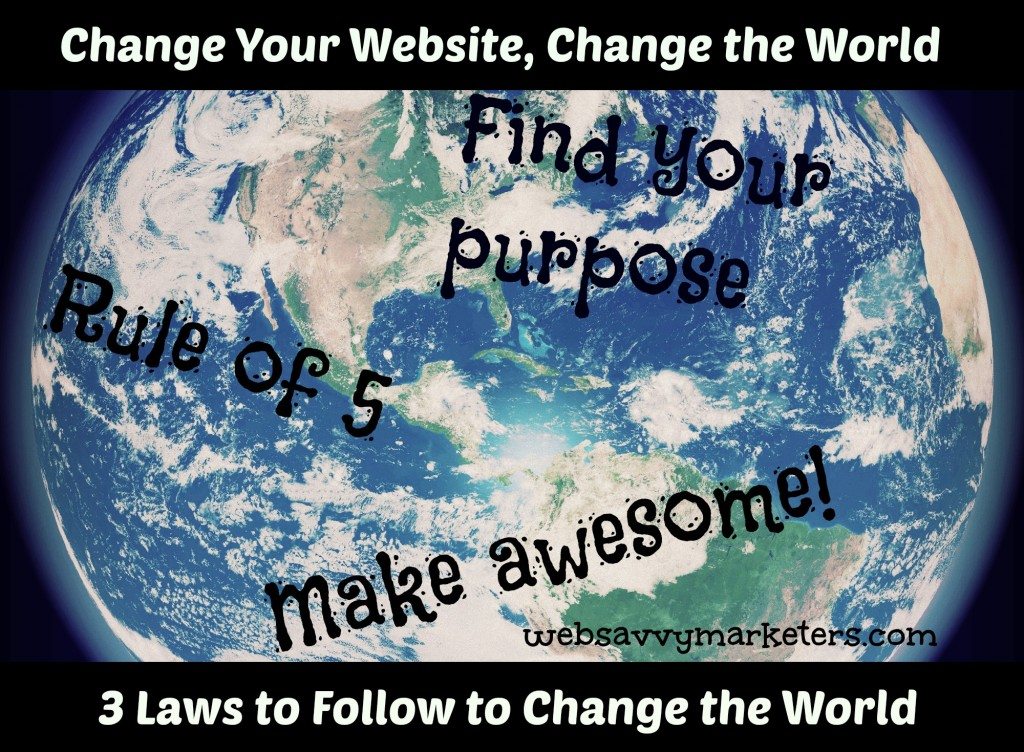 You don’t have to be Buddhist to appreciate the Dalai Lama’s Change Your Mind, Change the World conference. In fact, his basic premise to global well-being is to put aside such labels and focus on our common humanity.
You don’t have to be Buddhist to appreciate the Dalai Lama’s Change Your Mind, Change the World conference. In fact, his basic premise to global well-being is to put aside such labels and focus on our common humanity.
How can we encourage this common good for humanity in our websites, our businesses, and our daily efforts to interact with others?
Michael Holmes, author of I Shall Raise Thee Up: Ancient Principles for Lasting Greatness, supplied three universal laws for achieving change.
Anyone who wishes to avoid repeated and lasting failure knows these laws. As Cecil B. DeMille said, “It is impossible for us to break the law. We can only break ourselves against the law.”
3 Laws to Change the World
1. Purpose
“The Law that states no person can achieve maximum effectiveness without knowing who and why they are.”
To know your purpose is to know how your unique gifts and position will affect change.
When determining your purpose, always consider your audience. When considering your audience, always ask what’s in it for them.
If you’re stuck in finding your purpose, think about what’s holding you back. Max Simon of Big Business Vision suggests that rather than focusing on how much it will cost to update your website or create a marketing plan, ask “what’s the cost of doing nothing?”
Focus on your purpose and how it will benefit your audience. How will your leadership bring them something worthwhile?
In “Modern Laws of Global Life, the Law of Purpose,” “the end result of an action is already contained in the original thought.” If we want to change the world, we must first change the purpose behind the action.
So make it a good one.
2. Persistence
“The law that states only through consistent and continuous effort can any plan, vision, or achievement be realized.”
As Paul Jun explains for any craftmanship: it’s a journey, not a destination. You’re in it for the long haul.
So what do you do for this long haul? Apply the Rule of Five.
Jack Canfield of Chicken Soup for the Soul tells how he used this persistence principle to get his book onto the bestseller list for over a year. He uses the analogy of chopping down a tree.
“If you would go every day to a very large tree and take five swings at it with a very sharp ax, eventually, no matter how large the tree, it would have to come down.”
The Rule of Five for you might include
- emailing 5 potential customers
- writing 5 blog posts
- scheduling 5 interviews
- calling 5 current customers
Like climbing a mountain, keep your eye on the summit or your purpose, but begin with taking measured steps and doing five specific things to get there.
Because you will get there.
3. Service
“The Law that states in order to be greatest of all one must be servant of all.”
- A business owner wanting to make his company great.
- An artist looking for recognition.
- A speaker trying to make a difference.
- A musician bending the rules.
- A service provider going the extra mile.
- A writer writing to impact for a common good.
What do the success of these people have in common? They make awesome!
(Seriously, check that link out. You do want to make awesome, don’t you?)
How you choose to interact with your audience becomes a way for you to engage in service for others. Changing the world, as Margaret Mead said, requires thoughtful and committed citizens.
Communicate something useful and true and don’t stop. For them. That’s the beginning of service, and making awesome.
The Dalai Lama believes “if we make consistent effort, based on proper education, we can change the world. We are selfish, that’s natural, but we need to be wisely selfish, not foolishly selfish. We have to concern ourselves more with others’ well-being, that’s the way to be wisely selfish.”
Sounds to me a lot like the 3 Laws to Change the World. Now let’s go out there and begin.